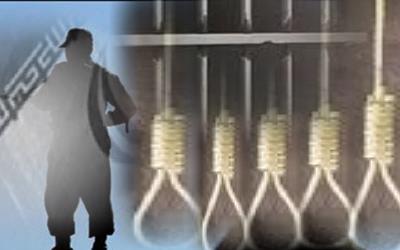Iran regime steps up executions; 21 hanged in 48 hours
Wednesday, 18 May 2016/ NCRI
Iran’s fundamentalist regime has sharply increased its rate of executions, carrying out at least 21 hangings in a 48-hour period this week. Two men were hanged earlier on Wednesday in the Central Prison of Urmia (Orumieh), north-west Iran. They were identified as Dariyoush Farajzadeh and Ghafour Qaderzadeh. Another two men were hanged on Wednesday in a prison in Yasuj, central Iran, according to Mehrdad Karami, the regime’s prosecutor in the city. The men, whose names were not given, were 26 and 34 years old, he said. A man, only identified by his initials S. R., 31, was hanged on Wednesday in a prison in Sari, northern Iran, according to the regime’s judiciary in Mazandaran Province. The state broadcaster IRIB, quoting the regime’s judiciary in Yazd Province, central Iran, announced on its website that eight prisoners were hanged in the province on Tuesday. The regime’s Prosecutor in Yazd Province had earlier told the state-run Rokna news agency that six people had been hanged in the province on Tuesday. A separate report from Isfahan, central Iran, said that a prisoner was hanged in the city’s notorious Dastgerd Prison on Monday, May 16. He has been identified as Malek Salehi, 35.
Six men were hanged collectively in the Central Prison of Urmia on Tuesday, May 17. They had been serving a prison sentence in Ward 15 of the jail on drugs-related charges. They were identified as Naji Keywan, Nader Mohammadi, Ali Shamugardian, Aziz Nouri-Azar, Fereydoon Rashidi and Heidar Amini.
Also on Tuesday, a man was hanged in public in the north-eastern city of Mashhad. (PHOTOS published here) The victim, who was not named, was hanged at 7 am in the city’s Mofatteh Square. His sentence had been upheld by the regime’s Supreme Court. Ms. Farideh Karimi, a member of the National Council of Resistance of Iran (NCRI) and a human rights activist, on Tuesday criticized the lack of response by the international community and human rights groups to the appalling state of human rights in Iran. The latest hangings bring to at least 97 the number of people executed in Iran since April 10. Three of those executed were women and one is believed to have been a juvenile offender. Iran’s fundamentalist regime last week amputated the fingers of a man in his thirties in Mashhad, the latest in a line of draconian punishments handed down and carried out in recent weeks. The National Council of Resistance of Iran (NCRI) said in a statement on April 13 that the increasing trend of executions “aimed at intensifying the climate of terror to rein in expanding protests by various strata of the society, especially at a time of visits by high-ranking European officials, demonstrates that the claim of moderation is nothing but an illusion for this medieval regime.”
Amnesty International in its April 6 annual Death Penalty report covering the 2015 period wrote: “Iran put at least 977 people to death in 2015, compared to at least 743 the year before.” “Iran alone accounted for 82% of all executions recorded” in the Middle East and North Africa, the human rights group said.
There have been more than 2,300 executions during Hassan Rouhani’s tenure as President. The United Nations Special Rapporteur on the human rights situation in Iran in March announced that the number of executions in Iran in 2015 was greater than any year in the last 25 years. Rouhani has explicitly endorsed the executions as examples of “God’s commandments” and “laws of the parliament that belong to the people.”
Iran: Thirteen executions in a single day
Wednesday, 18 May 2016/ NCRI
Javad Larijani, the regime’s head of human rights, acknowledges a “torrent of executions” and justifies torture and brutal punishments under the pretense of Qisas describing them as “holy verdicts”The mullahs’ antihuman regime hanged 13 prisoners on May 17 in the cities of Yazd, Urmia and Mashhad. In Yazd and Urmia 12 prisoners were collectively hanged. One prisoner had been condemned to death just for thievery. Also in Mashhad, a young prisoner was publicly hanged. A placard posted at the hanging site described the death penalty as an “element for the survival and establishment of security in the society.”A day prior to these collective executions, Javad Larijani, the brother of the head of the judiciary and the regime’s theorist of torture and execution who is the head of the so-called “human rights” institution, confirmed the “torrent of executions related to narcotics.” He expressed concern that the cruel punishments of the mullahs’ Sharia Law are being questioned, stating: “Regretfully, today, the Qisas verdict which is a holy verdict… is being questioned… the universality of the United Nations documents does not mean that the Western lifestyle is the best model… this is exactly where we should strongly stand up.” He then resorted to justifying torture, noting: Some “believe that any corporal punishment is torture, whereas torture is to use force to extract something.” (State-run Aftab website, May 16) On this same day, Abbas Jafari Dolatabadi, Tehran’s criminal prosecutor, brazenly said: “Officials in Western countries always bring up allegations relating to human rights… against Iran that lack any basis in reality.” When the medieval regime acknowledges a “torrent of executions” and describes atrocious and medieval punishments such as chopping of hands and gouging out of eyes as “holy verdicts” and justifies torture, this shows that it cannot sustain its rule for a single day without resorting to execution and suppression. This is where all factions of the mullahs’ regime are one and the same, and any propaganda about a moderate faction is a despicable deception that serves to justify trade with this regime. However, without paying any heed to these absurd propaganda, the Iranian people demand nothing less than the overthrow of this regime and the establishment of democracy in Iran.Secretariat of the National Council of Resistance of Iran/May 18, 2016






















